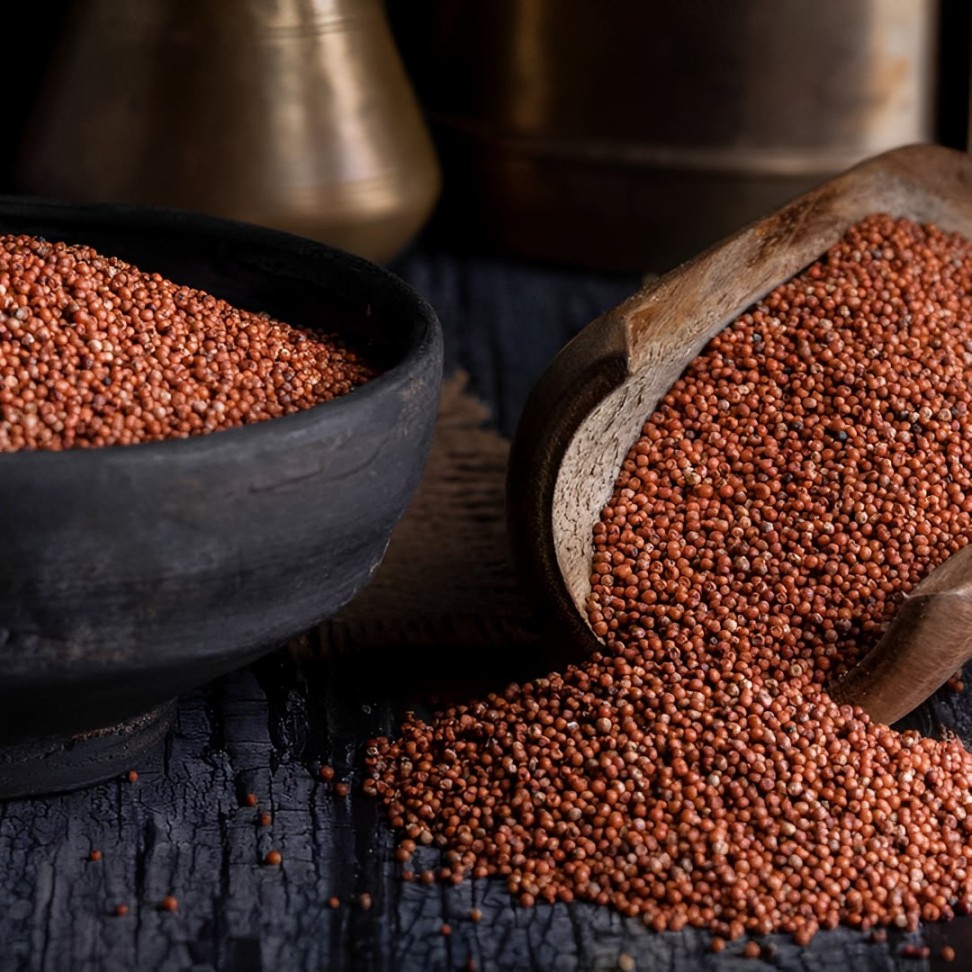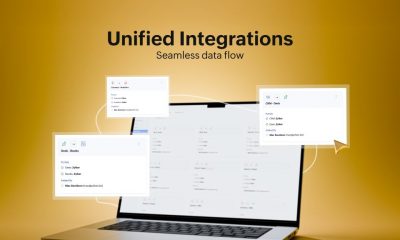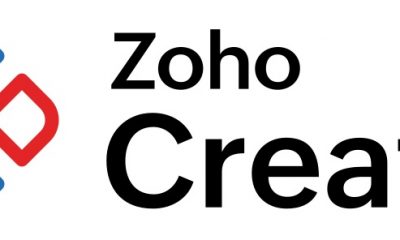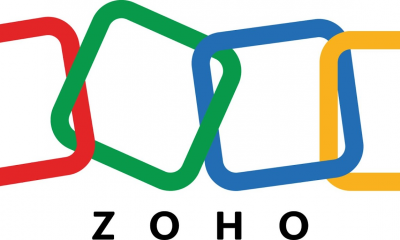Feature/OPED
Africa’s Food Security: Promotion of Millet Consumption and Cultivation

By Shmuel Ja’Mba Abm
The year 2023 was the year Millet was declared by none other body than the world-renowned United Nations as the Crop of the Year. Apart from its nutritional values, scientists have discovered, that millet doesn’t only reverse diabetes (type II) but also prevents the onset of diabetes. When its potential is exploited to the fullest, millet comes as the best of crops to give optimum attention and consideration for food security on the following grounds.
Millet is considered the sixth most important cereal in the world. It is a drought-resistant crop and adapts well in less fertile lands. When nursed and transplanted, a single sown grain is capable of shooting several tillers making up to 20 stalks to carry several panicles, which gives it an increased yield per grain, thereby increasing its food security measure in density.
A good source of carbohydrates, fibre, minerals, proteins and key vitamins, potential health benefits of millet include protection against cardiovascular diseases. It helps in healthy weight loss and the management of inflammation in the gut. Millet is also gluten-free.
In Ghana, only pearl and sorghum millet are grown, although several other types of millet are cultivated elsewhere in West Africa, such as fonio. Millet is originally native to the highlands of East Africa with the domestication of finger millet before the third millennium BCE.
Pearl millet is cultivated mainly in the Upper East and in the Upper West Regions, whilst the Northern, North East and Savanna Regions also cultivate sorghum, also grown in the two Upper Regions. Two types of pearl millet grow in Ghana – naara (early-bearing millet) and zia (late-bearing millet).
Naara millet is processed and eaten in several ways, including freshly harvested and roasted over a fire and peeled or eaten from the cob, unlike zia. Both naara and zia are used to prepare local dishes like foroforo, kooko, maasa, zomkom, or tuozaafi – all fermented.
Both naara and zia are used to make kaponu, or buttered zom, using shea butter. Both types could be chewed or eaten in their raw unprocessed state, when dried or freshly harvested. In modern times, tasty biscuits or cakes are made from millet, when the flour is substituted for barley, rye or wheat.
Sorghum is an excellent substitute for barley, rye and wheat for those who can’t tolerate gluten. In general terms, pearl millet or sorghum millet flour is used to do anything barley, rye or wheat flour should do.
It is used to make leavened and unleavened bread. It is used to prepare couscous, including making of fermented and unfermented beverages. It is the raw material for the brewery of pito, name of the indigenous beer.
For the 2023 crop season, an estimated 333,440 metric tons of sorghum was harvested in Ghana. Since 2017, the annual demand for millet grew by an average of 0.2%.
The history of cultivation of millet in Navrongo goes back to the 4,000 or more years of its existence. Navrongo is a historic and the second most important town of the Upper East Region in Ghana.
Millet consumption among people within the Sahel and Savanna regions of West Africa is rising due to its nutritional values and consciousness of healthy eating habits among the new generation. According to cultures, preparations differ from region to region.
But zomkom is common, from Burkina Faso and Ghana; through Niger and Northern Nigeria, where it is known among Hausa-speaking people as kunu. Zomkom or kunu is easy to prepare. A handful or two is enough to serve one person. Zomkom is a drink, with the residue of ground millet eaten after it.
Though others prefer it fermented, zomkom in many homes comes unfermented. However, it is uncooked. Ground coarsely, others prefer eating it with pepper and shea butter, after a thorough mixing, kneading and squeezing the flour into palm-sized balls before pouring water into it. The water is drunk first. Then the food is eaten scooped in piecemeal. The same mixture could be eaten with sugar and/or milk.
Or when preferred cooked, the coarsely grounded millet flour is poured into a boiling water of mushrooms or a protein of choice with salt, a paste of tomatoes, Bell pepper, chillies spinach or any preferred green. The quantity is determined according to the servings required. Stir till thickened to choice.
Tuozaafi is eaten among the Sahel and Savanna natives. The word tuozaafi is in Hausa, meaning its patronage across Northern Nigeria and Niger, Burkina Faso, Ghana and wherever in West Africa millet is cultivated. Tuozaafi is often prepared, preferably with a small quantity of finely ground flour fermented overnight.
The quantity of water used for the fermentation is according to one’s preference, whether intense or light fermentation. The fermented water is poured out of the container into a larger cooking pot, leaving the fermented flour in the container.
Fresh water is added to the fermented water in the cooking pot and boiled. Then contents of the fermented flour are stirred and drained gradually into the boiling water of mixed fermented water and fresh water in the cooking pot. Stir continuously for a while. Leave to boil into porridge, some of which could be fetched down and drank as kooko.
After the porridge in the cooking pot boils for a while, a handful quantities of dry finely ground flour is added gradually and stirred with the porridge. The quantity of dry flour is according to the grade of thickened pulp of porridge sought. Tuozaafi is eaten with okra sauce prepared in the West African style.
Others eat it with peanut butter sauce cooked with protein of choice and ingredients like grounded tomatoes, chillies, cabbage, salt, and aubergine. Add beef or chicken stock to taste, if preferred. Or add dawadawa. Dawadawa is the Hausa word for local protein-rich fermented and cooked monkey fruit nuts.
The connection to millet cultivation is ancestral, passed on passionately from generation to generation. The Navrongo Millet Experiment Farm is the result and a launch into the future. The prospects are great, according to data and science.
It was a challenge to engage in agriculture at a time the new generation of youth are increasingly westernised, and are under peer pressure hopefully to secure nonexistent-to-secure white-collar jobs and live urban lives.
Also, this challenge became intense with uncertainty, when most farmers moved away from the cultivation of millet due to the effects of climate change on rainfall patterns, and declining yield due to several factors of declining soil fertility.
Data, however, puts forward and suggests millet as the future crop, due to the effects of climate change, making the weather drier and hotter, which millet has a proven record of resilience. However, it requires the inevitable development of improved modern agricultural practices and techniques to address falling soil fertility and irregular rainfall patterns, which in turn requires the sinking of investment through funding.
The challenge of engagement in agriculture was overcome by the resolve and determination to preserve and maintain an ancient crop, which use in the future is more impactful, imminent and resourceful to generations yet unborn.
This meant a need to modify past practices into modern agriculture to avert challenges in past agriculture practices, by use of improved land preparation methods, such as the use or procured tractor ploughing services. And this comes at a cost, due to rising costs in fuel, in particular diesel, another funding imperative.
The challenge with funding has not yet been overcome and has become the last hurdle to expand millet cultivation and launch the Navrongo Millet Experiment Farm into the mainstream limelight, currently at two acres. The land was underutilised for this season, due to the same reason.
Depending on revenue flow in subsequent years, the Navrongo Millet Experiment Farm will expectedly see projected expansion if revenue indicators show positive. Though millet is not highly susceptible to pest attacks, compared to other crops, improved storage is a non-negotiable future plan, which needs assistance.
Of course, it makes it easier to own a tractor complete with implements to give the project its all. Anything else like funding to finance the drilling of a borehole (s) to supply water for intermittent irrigation is a big boost to the project, too. The injection of working capital to support the project is such a lifeline to sustain the programme into the future
Shmuel Ja’Mba Abm has extensive scholarly publications that establish him as a leading academic expert in regional geopolitical dynamics and diplomatic relations in Africa. He is an author of e-monographs on geopolitics, ethnic conflicts, and political philosophy.
Feature/OPED
Daniel Koussou Highlights Self-Awareness as Key to Business Success

By Adedapo Adesanya
At a time when young entrepreneurs are reshaping global industries—including the traditionally capital-intensive oil and gas sector—Ambassador Daniel Koussou has emerged as a compelling example of how resilience, strategic foresight, and disciplined execution can transform modest beginnings into a thriving business conglomerate.
Koussou, who is the chairman of the Nigeria Chapter of the International Human Rights Observatory-Africa (IHRO-Africa), currently heads the Committee on Economic Diplomacy, Trade and Investment for the forum’s Nigeria chapter. He is one of the young entrepreneurs instilling a culture of nation-building and leadership dynamics that are key to the nation’s transformation in the new millennium.
The entrepreneurial landscape in Nigeria is rapidly evolving, with leaders like Koussou paving the way for innovation and growth, and changing the face of the global business climate. Being enthusiastic about entrepreneurship, Koussou notes that “the best thing that can happen to any entrepreneur is to start chasing their dreams as early as possible. One of the first things I realised in life is self-awareness. If you want to connect the dots, you must start early and know your purpose.”
Successful business people are passionate about their business and stubbornly driven to succeed. Koussou stresses the importance of persistence and resilience. He says he realised early that he had a ‘calling’ and pursued it with all his strength, “working long weekends and into the night, giving up all but necessary expenditures, and pressing on through severe setbacks.”
However, he clarifies that what accounted for an early success is not just tenacity but also the ability to adapt, to recognise and respond to rapidly changing markets and unexpected events.
Ambassador Koussou is the CEO of Dau-O GIK Oil and Gas Limited, an indigenous oil and natural gas company with a global outlook, delivering solutions that power industries, strengthen communities, and fuel progress. The firm’s operations span exploration, production, refining, and distribution.
Recognising the value of strategic alliances, Koussou partners with business like-minds, a move that significantly bolsters Dau-O GIK’s credibility and capacity in the oil industry. This partnership exemplifies the importance of building strong networks and collaborations.
The astute businessman, who was recently nominated by the African Union’s Agenda 2063 as AU Special Envoy on Oil and Gas (Continental), admonishes young entrepreneurs to be disciplined and firm in their decision-making, a quality he attributed to his success as a player in the oil and gas sector. By embracing opportunities, building strong partnerships, and maintaining a commitment to excellence, Koussou has not only achieved personal success but has also set a benchmark for future generations of African entrepreneurs.
His journey serves as a powerful reminder that with determination and vision, success is within reach.
Feature/OPED
Pension for Informal Workers Nigeria: Bridging the Pension Gap

***The Case for Informal Sector Pensions in Nigeria
***A Crucial National Conversation
By Timi Olubiyi, PhD
In Nigeria today, the phrase “pension” evokes many different mixed reactions. For many civil servants and people in the corporate world, it conjures a bit of hope, but for the majority in the informal sector, who are in the majority in Nigeria, it is bleak. Millions of Nigerians are facing old age without any financial security due to a lack of retirement plans and a stable pension plan. Particularly, the millions who operate in markets, corner shops, transportation, agriculture, and loads of the nano and micro scale enterprises operators are without pension plans or retirement hope.
From the observation of the author and available records, staggering around 90 per cent of Nigeria’s workforce operates in the informal economy. Yet current pension coverage for this group is virtually non-existent. As observed, the absence of meaningful pension participation by this class of worker reinforces the vulnerability, intensifies poverty among older people, and puts pressure on families who are ill-equipped to shoulder the burden.
The significance of having a pension plan for informal workers in Nigeria, given the large number of people in that sector and the high level of unemployment and underemployment, cannot be overstated. As it is deeply connected to sustenance and the level of poverty in the country. Pension for informal workers in Nigeria is not just a technical policy matter; it is a story about dignity, security, and whether a lifetime of hard work ends in rest or in desperation.
Nigeria’s pension system, primarily structured around the Contributory Pension Scheme (CPS) managed by the National Pension Commission (PenCom), has made significant progress for formal sector employees, yet the large portion of the informal workforce which are traders, artisans, okada riders, small-scale farmers, domestic workers, and gig economy participants who drive the real engine of the economy.
Though the Micro Pension Plan (MPP) was launched in 2019, which is intended to provide a voluntary contributory framework for informal workers, its uptake has been underwhelming; after several years, only a fraction of the millions targeted have enrolled, and far fewer contribute actively. One big reason for this is that, unlike formal workers who receive regular salaries and have employers who deduct and remit pension contributions, informal workers face irregular incomes, a lack of documentation, limited financial literacy, and deep mistrust of government institutions, making traditional pension models ill-suited for their realities.
Moreso the informal worker most times live on day-to-day income. For instance, a motorcycle rider in Lagos who earns ₦14,000 on a good day but must pay for fuel, bike maintenance, police “settlements,” and family expenses, how can he realistically commit to a monthly pension contribution when his income fluctuates wildly? So, the Micro Pension Plan for the informal sector participation will remain low due to poor awareness, complex processes, lack of tailored contribution flexibility, and limited trust.
To truly make pensions work for informal workers, Nigeria must rethink the system from the ground up, designing it around the lived realities of its people rather than forcing them into rigid formal-sector structures. First, the government should introduce a co-contributory model where the state matches a percentage of informal workers’ savings, similar to what is practised in some European countries, turning pension contributions into a powerful incentive rather than a burdensome obligation.
Second, digital technology must be leveraged aggressively—mobile-based pension platforms linked to BVN or NIN could allow daily, weekly, or micro-contributions as small as ₦100, integrating seamlessly with fintech apps like OPay, Paga, or bank USSD services so that saving becomes as easy as buying airtime.
Third, automatic enrollment through cooperatives, trade unions, market associations, and transport unions could significantly expand coverage, with opt-out rather than opt-in mechanisms to counter human inertia.
Fourth, financial literacy campaigns in local languages via radio, community leaders, and religious institutions are essential to rebuild trust and demonstrate that pensions are not a “government scam” but a personal safety net.
Fifth, Nigeria should consider a universal social pension for elderly citizens who never participated in formal or informal schemes, modelled after systems in countries like Denmark and the Netherlands, ensuring that no Nigerian dies in poverty simply because they worked outside formal structures.
Sixth, investment strategies for pension funds must prioritise both security and development—allocating a portion to infrastructure projects that create jobs, improve power supply, and stimulate economic growth while maintaining prudent risk management.
Seventh, inflation protection should be built into pension payouts so that retirees’ purchasing power is not eroded by Nigeria’s volatile economy.
Eighth, the system must be inclusive of women, who dominate the informal sector yet often lack property rights or formal identification, by simplifying documentation requirements and providing gender-sensitive outreach.
Ninth, limited emergency withdrawal options could be introduced—strictly regulated—to help contributors handle crises without abandoning the system entirely.
Finally, transparency and accountability are non-negotiable; regular public reporting, independent audits, and user-friendly dashboards would strengthen confidence that contributions are safe and growing. If Nigeria can blend its innovative spirit with lessons from global best practices—combining Denmark’s social security ethos, Singapore’s savings discipline, and Canada’s inclusivity—it could transform the lives of millions of informal workers who currently face retirement with fear rather than hope.
Imagine Aisha, years from now, closing her market stall not in exhaustion and anxiety but in calm assurance that her pension will cover her basic needs; imagine Tunde hanging up his helmet knowing he can afford healthcare and shelter; imagine Ngozi harvesting not just crops but the fruits of a lifetime of secure savings. The suspense that hangs over the future of Nigeria’s informal workers can be resolved, but only if policymakers act boldly, creatively, and compassionately—because a nation that allows its hardest workers to age in poverty is a nation that undermines its own prosperity, while a nation that secures their retirement builds not just pensions, but peace.
Hope comes from innovation. Fintech-powered pension models that allow small, frequent contributions similar to informal savings associations like esusu offer ways to integrate pensions into existing savings cultures. Making pension contributions compatible with mobile money and agent networks could drastically reduce barriers to entry. Hope comes from public education. Building financial literacy campaigns, partnering with community leaders, marketplaces, trade associations, and digital platforms can help shift perceptions. A pension should be understood not as a distant bureaucratic programme, but as future self-insurance and dignity
The significance of having a pension plan for informal workers in Nigeria, given its large informal sector and high level of unemployment and underemployment, cannot be overstated, as it is deeply connected to social stability, economic sustainability, poverty reduction, and national development.
First, from a social protection and human dignity perspective, a pension plan for informal workers is critical because it provides a safety net for old age. Nigeria’s informal sector includes traders, artisans, mechanics, tailors, hairdressers, okada riders, gig workers, domestic workers, small-scale farmers, and street vendors, many of whom work hard throughout their lives but have no formal retirement benefits. Without a pension, these individuals often become completely dependent on their children, relatives, or charity in old age, which can strain families and increase intergenerational poverty. A well-structured pension system ensures that ageing informal workers can maintain a basic standard of living, access healthcare, and avoid extreme deprivation, thereby preserving their dignity and reducing elderly vulnerability.
Second, from an economic stability and poverty reduction standpoint, pensions play a crucial role in reducing old-age poverty. Nigeria already struggles with high poverty levels, and a large proportion of elderly citizens without income support exacerbates this problem. When informal workers lack pension savings, they continue working well into old age, often in physically demanding jobs, which reduces productivity and increases health risks. A pension system allows for smoother retirement transitions, reduces reliance on welfare, and ensures that older citizens remain consumers rather than economic burdens, thereby sustaining economic activity.
Third, pensions for informal workers are significant for financial inclusion and savings culture. Many Nigerians in the informal sector operate primarily in cash and have limited engagement with formal financial institutions. A pension plan tailored to informal workers, especially one integrated with mobile money and digital platforms, can encourage regular saving, improve financial literacy, and bring millions of people into the formal financial system. This, in turn, strengthens Nigeria’s overall financial sector and increases the pool of domestic savings available for investment in infrastructure, businesses, and development projects.
Fourth, the significance is evident in reducing dependence on government emergency support. Currently, the Nigerian government often has to intervene with ad-hoc social assistance programs, especially during crises such as the COVID-19 pandemic, inflation shocks, or economic downturns. If informal workers had functional pension savings, they would be better able to absorb economic shocks in retirement without relying heavily on government aid, reducing fiscal pressure on the state.
Fifth, pensions for informal workers contribute to intergenerational equity and family stability. In Nigeria, many elderly parents depend on their working children for survival, which places financial strain on younger generations who may already be struggling with unemployment, housing costs, and education expenses. A pension system reduces this burden, allowing younger Nigerians to invest in their own futures rather than being trapped in a cycle of supporting ageing relatives without external assistance.
Sixth, from a national development perspective, including informal workers in the pension system strengthens Nigeria’s long-term economic planning. Pension funds represent large pools of capital that can be invested in critical sectors such as housing, energy, transportation, and manufacturing. If millions of informal workers contribute even in small amounts, this could significantly expand Nigeria’s pension fund assets, providing stable, long-term financing for development projects that create jobs and stimulate growth.
Seventh, pensions for informal workers are important for gender equity, because women dominate many informal occupations in Nigeria, such as petty trading, market vending, tailoring, and caregiving roles. These women often have lower lifetime earnings, limited access to formal employment, and fewer assets. A targeted informal sector pension scheme can protect elderly women from destitution and reduce gender-based economic inequality in old age.
Eighth, the significance is also linked to public trust and governance. A transparent, accessible, and reliable pension system for informal workers can strengthen citizens’ trust in government institutions. Many informal workers currently distrust government programs due to past corruption, failed schemes, or poor implementation. A well-functioning pension plan that delivers real benefits would demonstrate that the state values all citizens, not just formal sector employees.
Lastly, given Nigeria’s demographic reality of a large and growing population, failing to integrate informal workers into a pension framework poses serious long-term risks. As life expectancy increases, the number of elderly Nigerians will rise significantly in the coming decades. Without a structured pension system for informal workers, Nigeria could face a severe old-age crisis characterised by mass poverty, social unrest, and increased pressure on healthcare and social services.
In summary, having a pension plan for informal workers in Nigeria is significant because it promotes social security, reduces poverty, enhances financial inclusion, supports economic stability, eases intergenerational burdens, strengthens national development, promotes gender equity, builds public trust, and prepares the country for its ageing population. For a nation where the majority of workers are informal, excluding them from pension coverage is not just an oversight; it is a major structural weakness that must be urgently addressed for Nigeria’s long-term prosperity and social cohesion.
Feature/OPED
Revived Argungu International Fishing Festival Shines as Access Bank Backs Culture, Tourism Growth

The successful hosting of the 2026 Argungu International Fishing Festival has spotlighted the growing impact of strategic public-private partnerships, with Access Bank and Kebbi State jointly reinforcing efforts to promote cultural heritage, tourism development, and local economic growth following the globally attended celebration in Argungu.
At the grand finale, Special Guest of Honour, Mr Bola Tinubu, praised the festival’s enduring national significance, describing it as a powerful expression of unity, resilience, and peaceful coexistence.
“This festival represents a remarkable history and remains a powerful symbol of unity, resilience, and peaceful coexistence among Nigerians. It reflects the richness of our culture, the strength of our traditions, and the opportunities that lie in harnessing our natural resources for national development. The organisation, security arrangements, and outlook demonstrate what is possible when leadership is purposeful and inclusive.”
State authorities noted that renewed institutional backing has strengthened the festival’s global appeal and positioned it once again as a major tourism and cultural platform capable of attracting international visitors and investors.
“Argungu has always been an iconic international event that drew visitors from across the world. With renewed partnerships and stronger institutional support, we are confident it will return to that global stage and expand opportunities for our people through tourism, culture, and enterprise.”
Speaking on behalf of Access Bank, Executive Director, Commercial Banking Division, Hadiza Ambursa, emphasised the institution’s long-standing commitment to supporting initiatives that preserve heritage and create economic opportunities.
“We actively support cultural development through initiatives like this festival and collaborations such as our partnership with the National Theatre to promote Nigerian arts and heritage. Across states, especially within the public sector space where we do quite a lot, we work with governments on priorities that matter to them. Tourism holds enormous potential, and while we have supported several hotels with expansion financing, we remain open to working with partners interested in developing the sector further.”
Reports from the News Agency of Nigeria indicated that more than 50,000 fishermen entered the historic Matan Fada River during the competition. The overall winner, Abubakar Usman from Maiyama Local Government Area, secured victory with a 59-kilogram catch, earning vehicles donated by Sokoto State and a cash prize. Other top contestants from Argungu and Jega also received vehicles, motorcycles and monetary rewards, including sponsorship support from WACOT Rice Limited.
Recognised by UNESCO as an Intangible Cultural Heritage of Humanity, the festival blends traditional fishing contests with boat regattas, durbar processions, performances, and international competitions, drawing visitors from across Nigeria and beyond.
With the 2026 edition concluded successfully, stakeholders say the strengthened collaboration between government and private-sector partners signals a renewed era for Argungu as a flagship cultural tourism destination capable of driving inclusive growth, preserving tradition, and projecting Nigeria’s heritage on the world stage.
-

 Feature/OPED6 years ago
Feature/OPED6 years agoDavos was Different this year
-
Travel/Tourism10 years ago
Lagos Seals Western Lodge Hotel In Ikorodu
-

 Showbiz3 years ago
Showbiz3 years agoEstranged Lover Releases Videos of Empress Njamah Bathing
-

 Banking8 years ago
Banking8 years agoSort Codes of GTBank Branches in Nigeria
-

 Economy3 years ago
Economy3 years agoSubsidy Removal: CNG at N130 Per Litre Cheaper Than Petrol—IPMAN
-

 Banking3 years ago
Banking3 years agoSort Codes of UBA Branches in Nigeria
-

 Banking3 years ago
Banking3 years agoFirst Bank Announces Planned Downtime
-

 Sports3 years ago
Sports3 years agoHighest Paid Nigerian Footballer – How Much Do Nigerian Footballers Earn




















